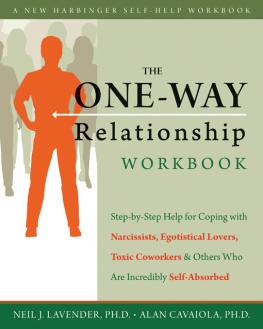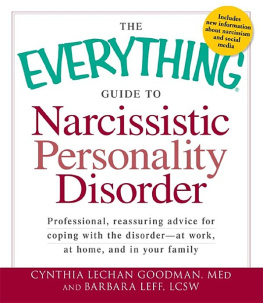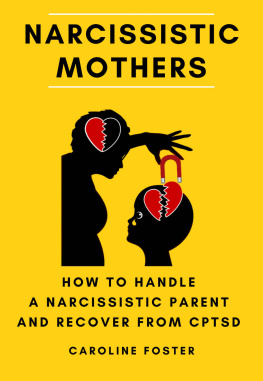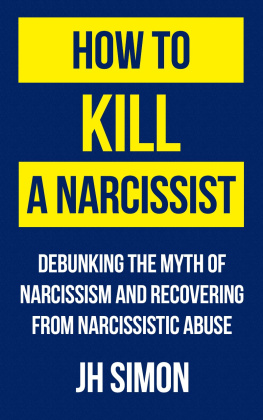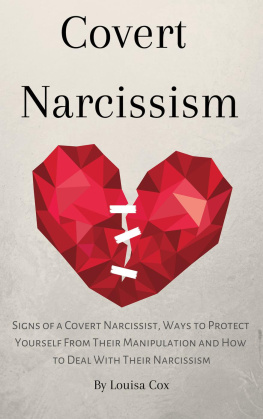Becoming the Narcissists Nightmare:
How to Devalue and Discard the Narcissist While Supplying Yourself
By
Shahida Arabi
Copyright 2016 by Shahida Arabi. All rights reserved. No part of this publication may be reproduced, distributed, or transmitted in any form or by any means, including photocopying, recording, or other electronic or mechanical methods, without the prior written permission of the publisher, except in the case of brief quotations embodied in critical reviews and certain other noncommercial uses permitted by copyright law.
Dedicated to all the survivors and warriors out there healing, thriving and transcending more and more every day.
Your voices, your stories, your contributions are all so important and valuable. Thank you for all you do and all that you are beautiful, strong, brilliant and finally -- free.
Special thanks to Lilly Hope Lucario, who remained a source of much needed moral support during the writing of this book. Your genuine, loving spirit remained a gentle reminder of a survivors power to continue working for the greater good.
Table of Contents
Preface
A few years ago on a survivors forum, I asked survivors what made them a narcissists worst nightmare the strengths, the talents, the assets, the attitudes and the actions that made them absolutely deplorable supply for abusive and toxic people.
Survivors came up with epic lists of traits that annoyed and frustrated their narcissistic partners this included having an incredible sense of humor and quick wit that could put a narcissists covert put-down to shame, the psychological resilience they had developed over the course of the relationship, their ability to empathize with others, their ability to intelligently and astutely question the narcissists false mask, their ability to emotionally connect with others, their thirst for knowledge, their confidence, their sensitivity, their compassion endless lists of amazing qualities that narcissists feared and abhorred.
What occurred to me was that our strengths the ones that narcissists often convince us are weaknesses are the very things that can save us from narcissists, which is why narcissists work so very hard to diminish these strengths in the first place. I also realized something even more incredible: that the techniques narcissists use against us can also be merged with those strengths to help us transcend and thrive after narcissistic abuse.
The very same techniques that narcissists use on us are the very same ones we must use to get over them. Confused? Let me explain. I am not suggesting becoming a narcissist ourselves or being cruel - not at all. These techniques will not be employed in the same way as a narcissist uses them they will be adapted to detach from the narcissist altogether. Read the following and see if you agree with me here:
You once idealized the narcissist, put him or her on a pedestal after he or she did the same to you. You saw them as the love of your life - at least, you saw their false self as the love of your life.
Now, you must devalue and discard the narcissist - both in your mind and in your physical reality, if you're still maintaining contact with him or her somehow. In this book, these terms will not only be explained in the context of abuse, but be adapted to the survivors own journey of detaching and healing from a narcissist.
Devaluing the narcissist means reconnecting with the reality of who the narcissist is, not who you wish him/her to be (the false self they once presented to you). In essence, devaluing in this context means dismantling your perception of their false self and replacing it with the reality of their true, abusive self. Chapter 1 and Chapter 2 will give you the information, knowledge and tools to identify the covert manipulation tactics of narcissistic abusers as well as their motives and intentions.
Discarding the narcissist means going No Contact with the narcissist or Low Contact if you share children, have legal matters to sort out with the narcissist or have any other circumstances that prevent you from cutting all ties with this person. This involves giving yourself closure by not giving the narcissist any. In Chapter 5, youll learn more about the journey to No Contact.
Re-idealizing and supplying yourself refers to using the tips and tools Ill mention Chapter 3 to release the toxic brainwashing from your narcissistic partner and begin to heal some of the biochemical and trauma bonds that have tethered you to your narcissistic abuser. This also involves creating a healthier, positive reverse discourse that substitutes self-defeating beliefs with empowering ones about yourself.
Triangulation in this case means welcoming new people into your life that will serve as a support network to you during this time. All this time, the narcissist has triangulated you with others to validate their own sense of superiority. Now you must triangulate your narcissist with a new support system to validate your experiences. This is not meant to make the narcissist jealous it is meant to give yourself the resources and empowerment you need to heal.
Due to your empathy and ability to emotionally connect, this triangulation has the added benefit of adding to your psychological resilience. Having at least one person who has your back and can snap you back to reality, who knows what you've been through, is invaluable. Having a whole community of other survivors who have your back? Well, now youre bound to be invincible. Well learn more about how to connect with these support networks while also getting rid of any defunct or toxic social networks (including the narcissists own harem) that no longer serve your emotional well-being in Chapter 5.
Reverse Gaslighting means that whenever the narcissist tries to pull a fast one on you, being able to use the knowledge about their manipulative tactics which youll learn in the first two chapters to distance yourself. This means going No Contact or Low Contact in response to their silent treatments, their stonewalling behavior, their petty put-downs and manipulation in order to prevent yourself from being pulled right back into their mind games.
Reverse Gaslight the narcissist by saying mentally to their accusations, projections and gaslighting tactics: I don't believe you. That's not what happened. I know my truth and I own my truth. Reverse Gaslighting the narcissist is not actually gaslighting - it involves staying grounded in your reality and your own powerful truth while invalidating the lies of a narcissist. This will help to relieve some of the cognitive dissonance you may have been experiencing as a result of being in a relationship with a narcissistic abuser who often distorts and manipulates your perception of reality.
Create a false self for the time being that serves as armor if and when you have to interact with the narcissist or even just start ruminating over them. This self is the strong, logical self that you must wear as you begin to detach and heal from a narcissist. The one you may not feel like during No Contact or Low Contact, but the one you must be, in order to resist their attempts to retraumatize you and bring you back into the relationship by pressing the reset button. Use this self to interact with the narcissist if you have to interact with them. Youll learn how to do this effectively through the methods well discuss in Chapters 3, 4, 5 and 6.
Using this false self enables you to be self-protective, centered and unreactive. Mirror them when you have to, much like they mirrored you during the idealization phase, by withdrawing from them when they withdraw, rather than pleading and begging for them. Strive not to mirror them when they attempt to pull you back into the trauma of the relationship. Do not share secrets and do not make them privy to your innermost feelings; in fact, I encourage you not to disclose anything about your personal life once youve realized your partner may be a narcissist. You are permitted to stop giving any information in the case where the narcissist may try to emotionally blackmail or manipulate you. They played mind games all along - now it's their turn to not have the facts at hand.






